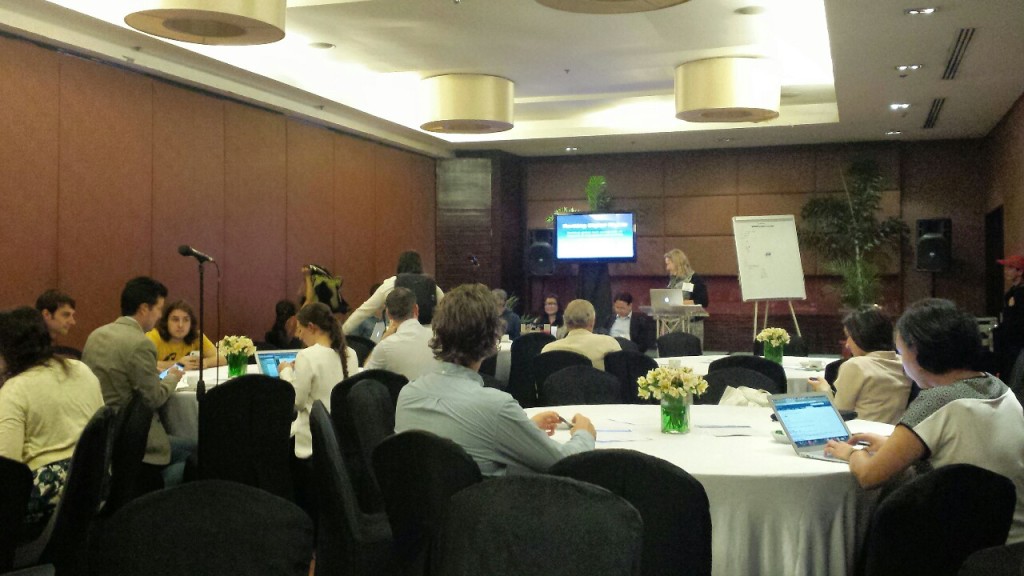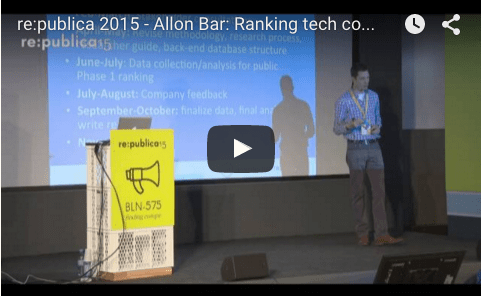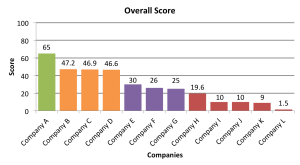Posted at 11:26h
in
Events,
News
by Priya Kumar
For the second year in a row, the Ranking Digital Rights team joined hundreds of advocates, technologists, government officials, and company representatives at RightsCon, a key annual gathering focused on Internet and human rights organized by our good friends at Access. This year’s conference was held in Manila, where we were thrilled to meet activists, researchers, and company representatives from all over Asia.
We shared our pilot study results and collected valuable feedback on how the project can help others who fight to defend digital rights. In a public session focused on setting clear standards for companies, panelists Donny BU of ICT Watch Indonesia, Nighat Dad of Pakistan’s Digital Rights Foundation, and Charles Mok, a Hong Kong legislator, joined Rebecca MacKinnon to discuss RDR’s goals and work.

RDR’s public session at RightsCon Manila. Photo: RightsCon
The companies that RDR evaluates are based around the world and operate in varied cultural environments and legal contexts. Even so, Donny BU asserted that it is fair to hold companies to standards that are grounded in international human rights principles, as RDR’s methodology does. Nighat Dad highlighted the need for more transparency on company practices, particularly when governments compel companies to act in a certain way. Citizens deserve to know if government requirements make a country’s business environment uncompetitive, Charles Mok added.
The Internet and human rights community faces myriad challenges in advocating for freedom of expression, privacy, and other online rights. RDR team members lent their expertise to several related discussions at RightsCon. We participated in the final drafting and launch of the Manila Principles on Intermediary Liability. RDR research fellow Tim Libert described his work on evaluating how mobile devices affect human rights, which relates directly to RDR’s phase two efforts to integrate software, device, and networking equipment manufacturers into the ranking. Allon Bar presented findings from the UNESCO report, “Fostering Freedom Online: The Role of Internet Intermediaries.” Rebecca MacKinnon spoke on panels about the Global Network Initiative, the need for remedy when people experience human rights violations online, the need for frameworks to address cross-border requests to remove online content, and the meaning of democracy in a networked era.
We also met with individuals from NGOs based around the world to discuss the project’s goals and how its ranking results can help other organizations in their research and advocacy work. Our first public ranking of Internet and telecommunications companies will be released in November. Prior to launch, we plan to work with a range of NGOs and researchers so that they will be prepared to use the information we publish to advance their own advocacy and research goals.
The ranking will examine publicly available information and companies’ own disclosures about their policy commitments and practices affecting users’ freedom of expression and privacy. The results and accompanying analysis will describe how companies can improve. The ranking will also highlight ways in which government regulation and laws prevent companies from respecting users’ rights. These details can help NGOs start conversations with companies about how to better respect users’ rights. In cases where government is the source of the problem, our data and analysis can provide facts that NGOs and companies can use to jointly pressure governments.
Several NGOs from across Asia and Latin America expressed interest in using RDR’s methodology as a template to examine or benchmark companies operating in their countries or regions. They told us it would be helpful to have the ranking results available in multiple languages and to receive training or guidance on how to apply the methodology to their local environment. RDR does not currently have resources for translation and training, but we welcome institutional partners who might be able to help us make the data and analysis accessible to more people in more languages and national contexts.
We left RightsCon excited about people’s enthusiasm for RDR, especially their desire to use the methodology we’ve developed and the data we will publish later this year. The global universe of ICT companies is much larger than what RDR (or any single organization) can currently evaluate, but if more organizations apply the methodology to their regions, develop other research projects to examine companies’ local practices and impact, and use the results to inform advocacy, we as a community can develop a more granular picture of where free expression and privacy stand in the ICT sector and where they might be headed. This will strengthen everyone’s efforts to fight for users’ rights.





